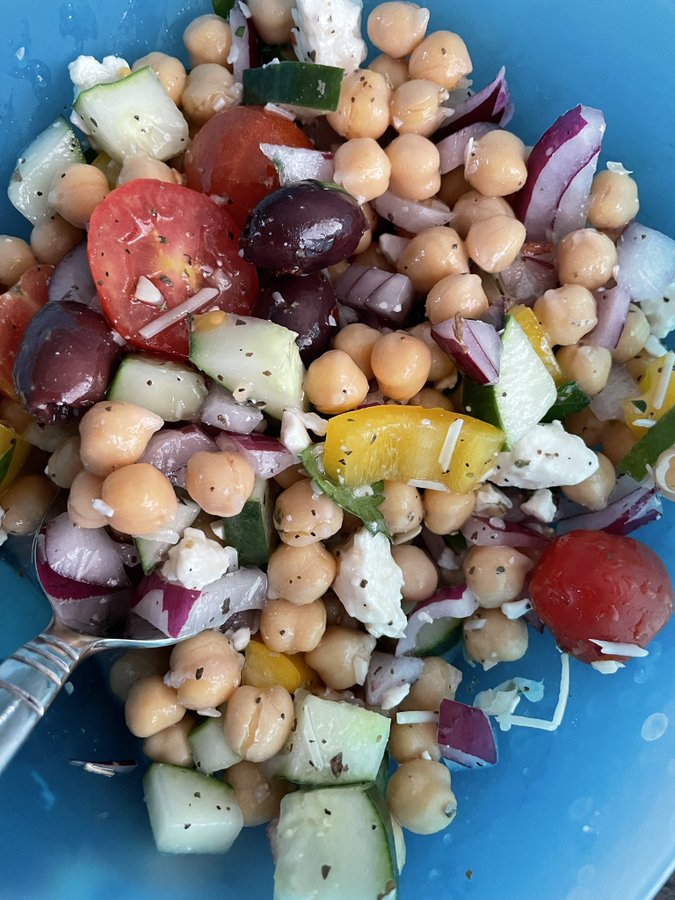The Mediterranean diet is a dietary pattern inspired by the traditional eating habits of countries bordering the Mediterranean Sea, such as Greece, Italy, Spain, and southern France. It's known for its emphasis on whole foods, plant-based ingredients, healthy fats, and moderate consumption of certain animal products. The diet has gained popularity for its potential health benefits, including reducing the risk of chronic diseases and promoting overall well-being.

Here are 20 reasons why you might consider shifting to a Mediterranean diet:
-
Heart Health: The Mediterranean diet is associated with a reduced risk of heart disease due to its emphasis on healthy fats, fibre-rich foods, and antioxidant-rich fruits and vegetables.
-
Longevity: Studies suggest that people who follow a Mediterranean diet tend to have longer lifespans and a reduced risk of chronic diseases.
-
Weight Management: The diet focuses on whole, nutrient-dense foods, which can contribute to healthy weight management.
-
Reduced Risk of Stroke: The diet's components, including olive oil, whole grains, and antioxidants, have been linked to a decreased risk of stroke.
-
Diabetes Prevention: The diet's emphasis on whole grains, legumes, and vegetables may help stabilize blood sugar levels and reduce the risk of type 2 diabetes.

-
Cancer Prevention: Some studies suggest that the diet's high intake of fruits, vegetables, and olive oil may contribute to a lower risk of certain cancers, including breast and colon cancer.
-
Brain Health: The healthy fats in the diet, such as those found in fish and olive oil, are believed to support cognitive function and reduce the risk of cognitive decline.
-
Inflammation Reduction: The diet's anti-inflammatory properties can help reduce chronic inflammation, which is linked to various health issues.
-
Rich in Fiber: The diet's focus on whole grains, legumes, fruits, and vegetables provides a good source of dietary fibre, promoting digestive health.
-
Nutrient Variety: The diet encourages the consumption of a wide variety of foods, ensuring a broad range of nutrients and antioxidants.
-
Heart-Healthy Fats: The consumption of monounsaturated fats from sources like olive oil and nuts supports cardiovascular health.

-
Lean Proteins: The Mediterranean diet includes lean sources of protein, such as fish and legumes, which can contribute to muscle maintenance and overall health.
-
Reduced Processed Foods: The diet emphasizes whole, unprocessed foods while minimizing highly processed and sugary options.
-
Bone Health: The diet includes calcium-rich foods like dairy, as well as vitamin D from sunlight and fatty fish, which support bone health.
-
Moderate Wine Consumption: Some versions of the Mediterranean diet include moderate consumption of red wine, which has been linked to heart health benefits.
-
Plant-Based Emphasis: The diet is predominantly plant-based, which is associated with a reduced carbon footprint and environmental impact.
-
Sustainability: The diet's emphasis on seasonal, local, and minimally processed foods aligns with sustainable food production practices.

-
Delicious and Flavorful: Mediterranean cuisine is known for its delicious flavours, making the diet enjoyable and sustainable.
-
Cultural and Social Aspects: The diet encourages shared meals and social connections, promoting overall well-being.
-
Flexibility: The Mediterranean diet allows for flexibility and adaptation to personal preferences while providing a framework for healthy eating.
The Mediterranean diet is associated with numerous health benefits, including reducing the risk of heart disease, stroke, type 2 diabetes, certain cancers, and cognitive decline. It's considered a sustainable and enjoyable way of eating that combines health and pleasure. However, it's important to tailor the diet to individual preferences and needs and consult with a healthcare professional before making any significant dietary changes, especially if you have specific health conditions or dietary restrictions.
© Copyright 2023. All Rights Reserved Powered by Vygr Media Private Limited.



















